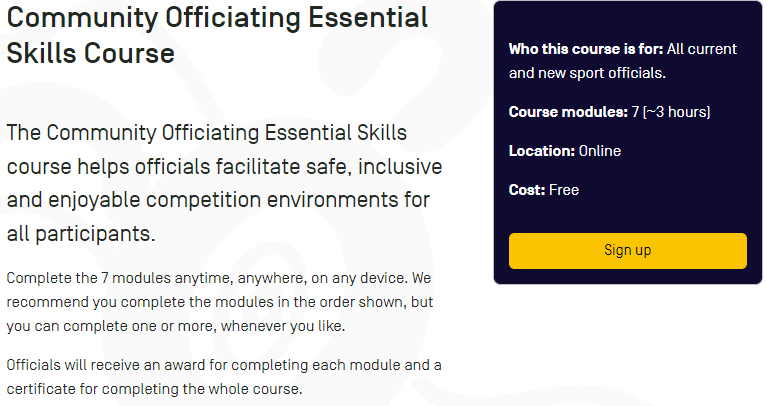A line in the sand for match officials: Q&A with Cameron Tradell (Part 1)
The Australian Sports Commission are taking an important lead in developing the essential skills of Match Officials.
Writing for Club Respect, Patrick Skene chats with Cameron Tradell. Cameron leads the Coaching and Officiating team at the Australian Sports Commission and recently launched the Community Officiating Essential Skills Course which is made up of 7 modules that are free and completed online.
The conversation will be presented in two parts.
Contents
- Community Officiating Essential Skills Course
- Moving with the times
- The ‘Line in the sand’ moment
- Why don’t umpires come back?
- The untapped power of match officials
- A new revolution of cultural traits?
- Bite-sized learning
- Build it, and they will come!
1. Community Officiating Essential Skills Course
Patrick Skene: Congrats on the launch of the Australian Sports Commission’s Community Officiating Essential Skills Course. How long has this moment been in the making?
Cameron Tradell: About four years. We had disruptions through COVID19 and we started doing some of the work with coaching because we couldn’t get out to do the filming of stories for the officiating course.
So, we were able to get most of the coaching pieces done, but we committed to making sure we could then focus on the officiating course which has been our key focus for about a year and a half, but it took a long time to bring this to fruition.
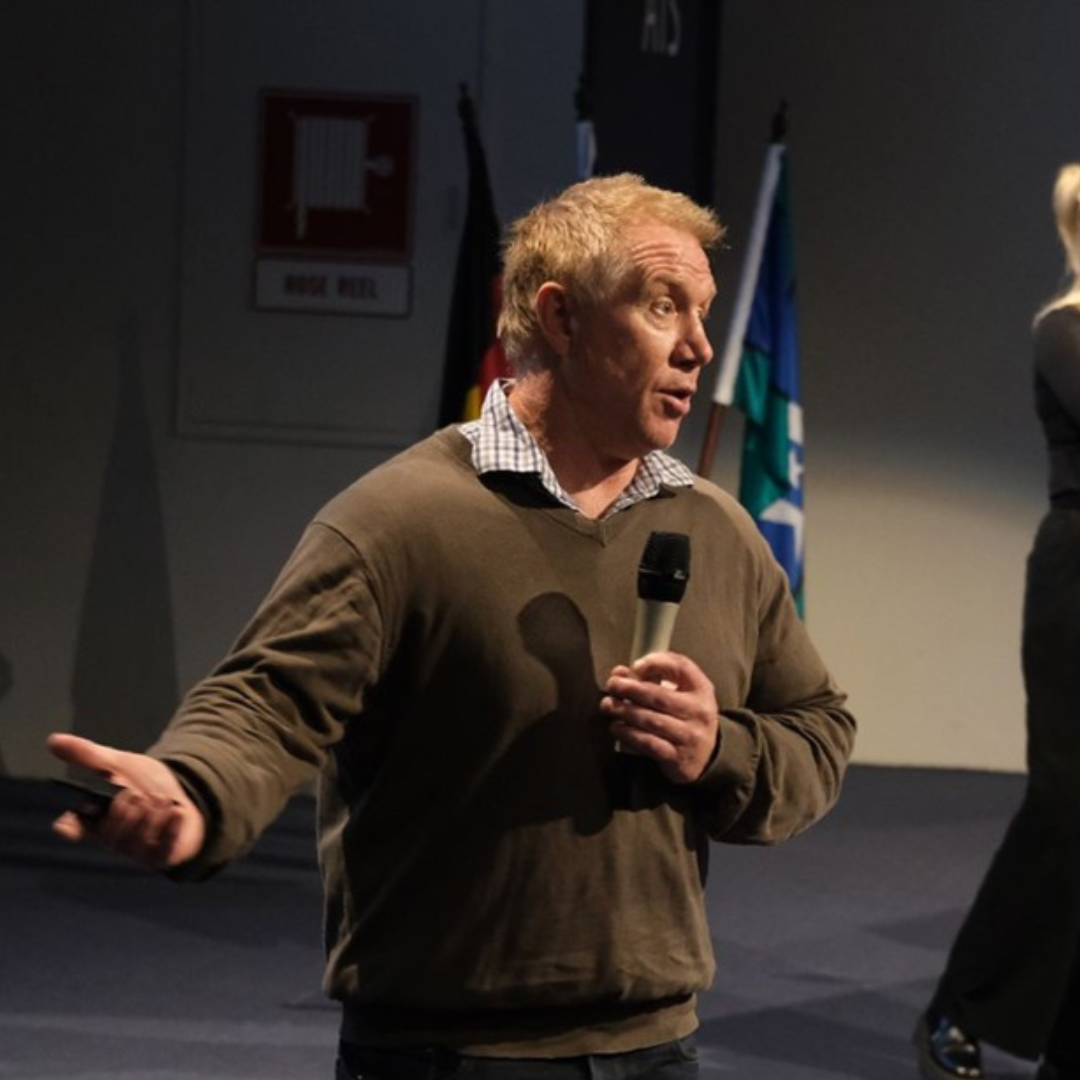
Cameron Tradell Photo: LinkedIn
Who are the key people driving it?
The beauty is that it was driven by the Australian Sports Commission, but also, by the sector. We’ve gone out to so many stakeholders who have said things have changed, that we need different support. They really helped us.
So we worked closely with a lot of the sports and that’s not just big sports but sports of all sizes and we’re talking about judging, talking about officiating on field, talking about the links between an active role an official plays in something like an AFL or a football where you’re more closely linked to an athlete and officiating roles when you’re a judge like a cricket umpire where you’re a little bit more static.
We talked about the nuances of officiating their sports and how they need to be serviced. And we built it in collaboration with the sector with over 45 Sports contributing. And that’s what we wanted the videos and the stories within that to reflect.
At design and execution level at the Australian Sports Commission, Brooke Kneebush has led the project from our side as head of the officiating projects. And if there’s a more outstanding leader in sport, I haven’t met them.
She is an authentic leader who had a real vision. And she found ways around challenges but the ways that she collaborates, the way that she’s meticulous in the way she works, she has been a real leader here.
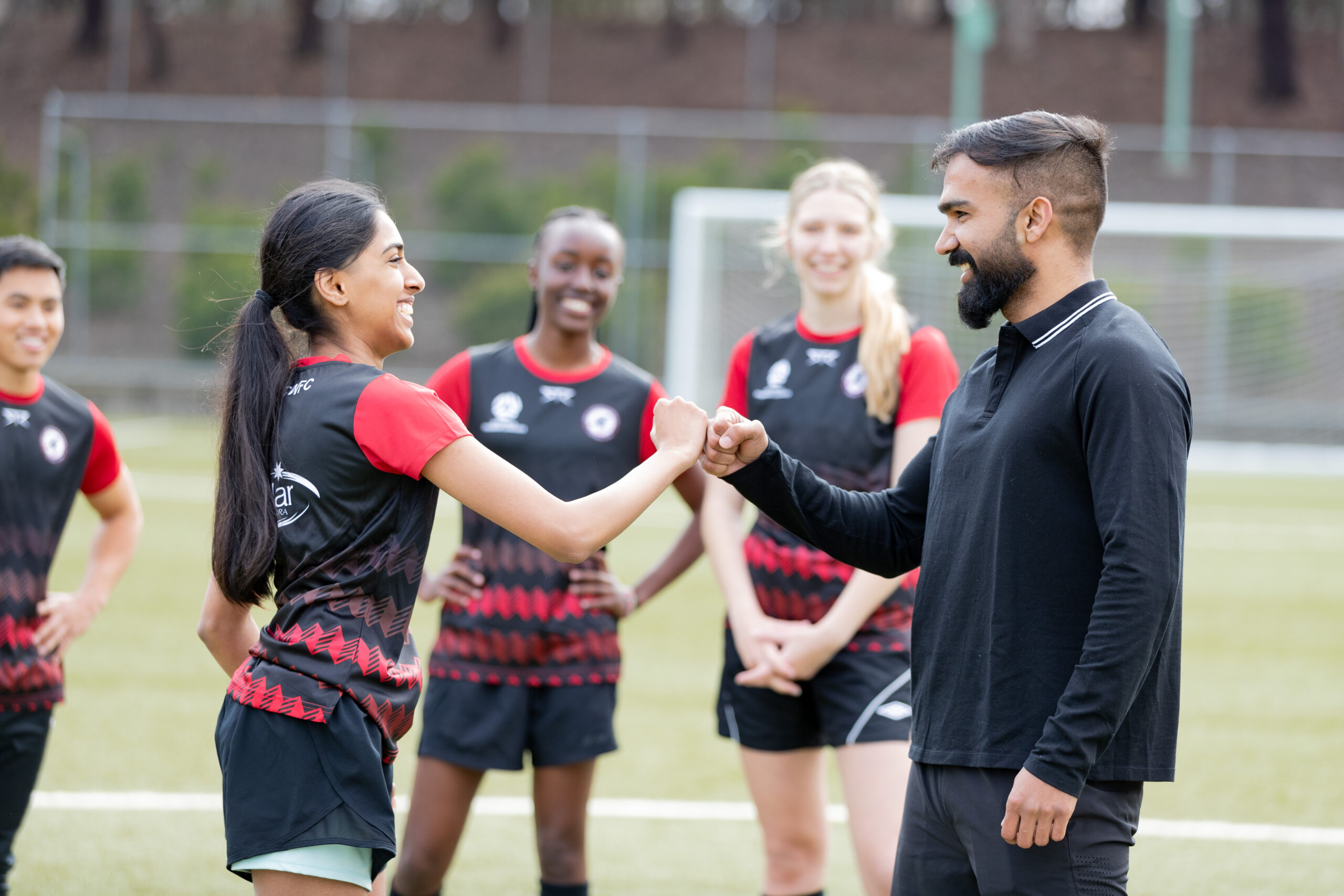
Picture: Australian Sports Commission
Why is this course necessary?
It’s necessary on many levels. The old system was created in 1979 and built on some of the old methodologies or certainly old research and data. So, that’s the old level one, level two, level three system.
And if you think about that from an operational perspective, if I’m an official who’s looking after U12s and I go and do my level one, I get a really good grounding in what officiating can look like and what I need to do.
If I want to get further education and do a level two, I’m starting to talk about some things that potentially don’t really apply to me at under 12 level.
And if I go and do a level three course, I might as well be officiating another sport.
This is where some of these issues become apparent. We can add people with the wrong levels of interest, officiating in the wrong areas. They are potentially officiating a game to the absolute rules, whereas we’ve got kids who are learning and developing, and therefore that isn’t supporting the environment to the level they need.
Now we also know the volunteer match officials are doing it out of the goodness of their heart.
Taking that into account we decided to go with a different model that provides ongoing personal development for you to grow and develop in the environment you’re officiating in.
Which in practice means if you’ve got learners who are just entering into the game, how do you create that environment, and how do you create the social contract, so that everyone understands what we’re there for?
And how do we create those relationships with coaches?
Just like the competitive environment, we want to make sure that we’re providing the education, training, and support services that they need, and also upholding the integrity of the sport, while always maintaining a level of respect.
Keep in mind that the Australian demographic is changing quickly. So, the ways that we communicate and connect may be slightly different from what we’ve seen before.
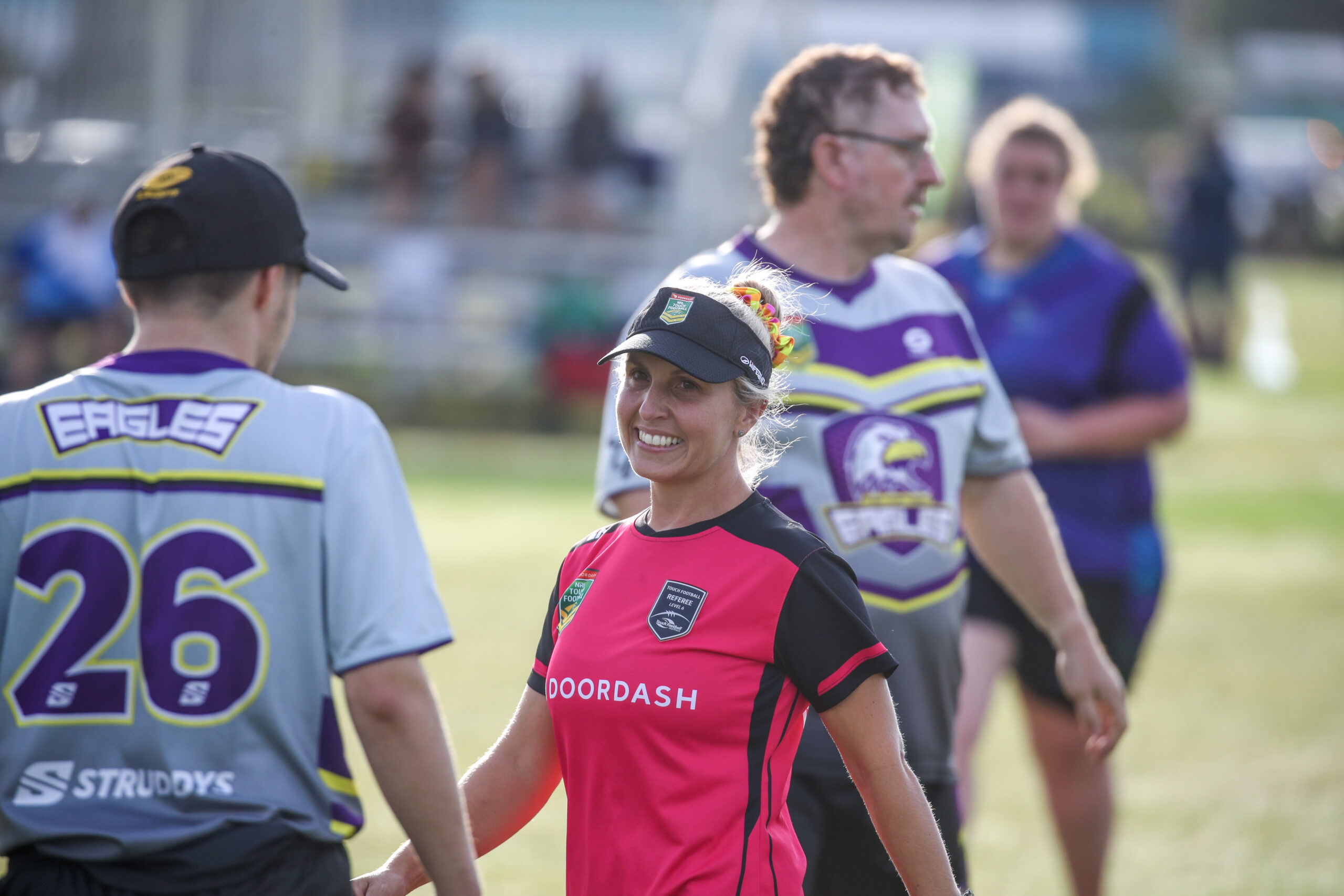
Picture: Australian Sports Commission
2. Moving with the times
The course references the ‘modern approach to officiating’ – explain the modern approach.
The modern approach is understanding people and motivations and the way they wish to interact with sport.
Some people are coming into sport without the background in the sport that we used to have, just because of the changing demographics and the changing needs of Australia.
So the modern approach is more about why are people playing and how do we service their needs in sport, while ensuring we uphold the integrity of the sport. We understand people are there for different reasons, so it’s person centred and trying to support as many people into sport as possible.
You collaborated with 45 sports in putting the course together – what were some of the common themes you found across different sports?
The common theme was this was an overdue requirement. Some of the sports felt like officials always get a hand-me-down approach rather than be the spotlight.
And we shifted that very quickly with regards to showcasing the clear focus we’ve got on officials and the role they play.
The second thing is the recognition of the changing relationship people have with sport, and that we’re currently not servicing it. So we’re servicing performance sport or competition pathways, but we’re not servicing all the other areas in a way that was appropriate.
The third thing was the fact we had a shift in the options of sport, with more social sport coming to the fore, but they didn’t have anything in there for officials.
So therefore, we’ll get the same officials servicing social sport as competition sport, and it didn’t marry up, so we needed to break apart the different ways people looked at, and were serviced by, their officials.
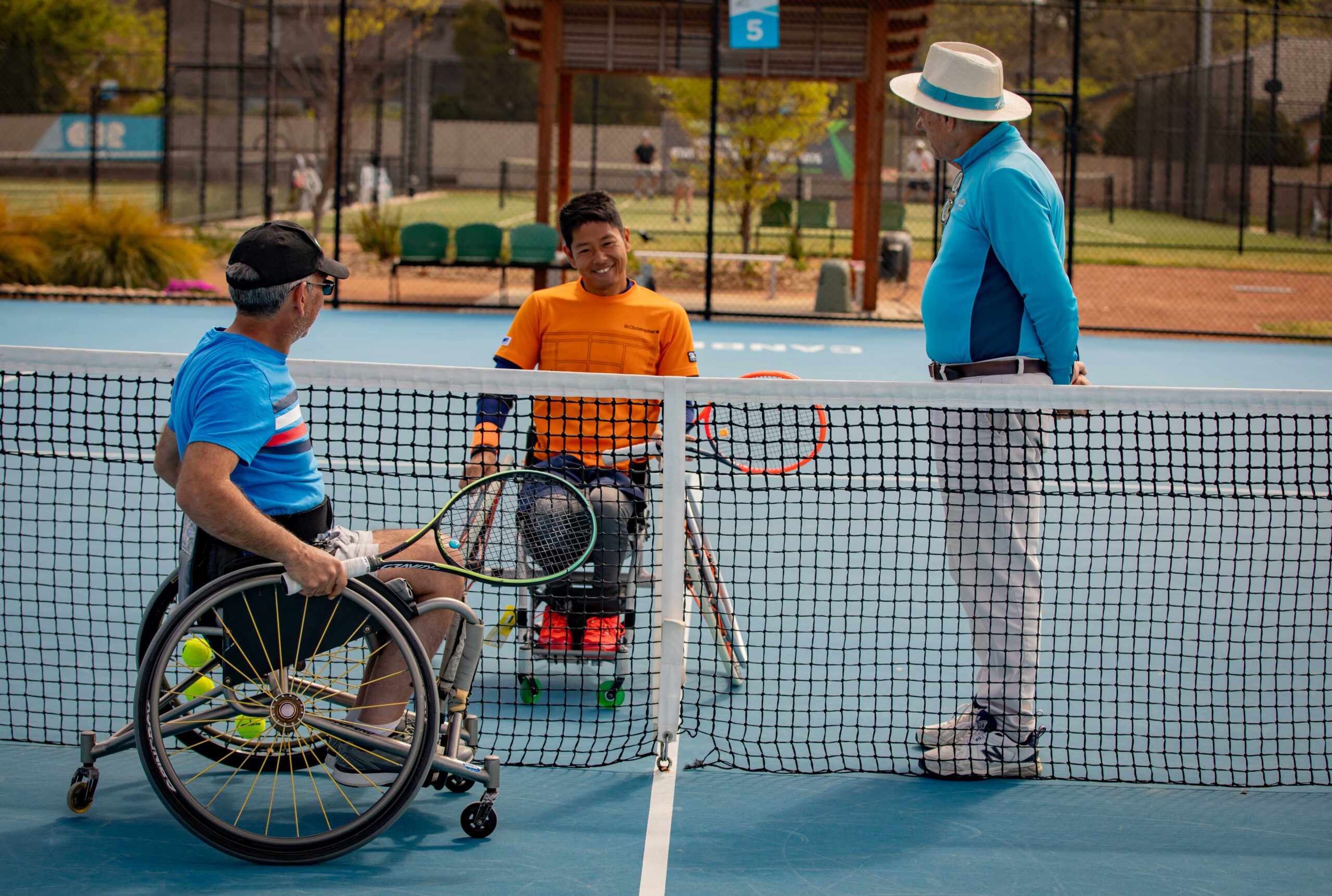
Picture: Australian Sports Commission
3. The ‘Line in the sand’ moment
I have written for Club Respect that abuse/disrespect of match officials is the blind spot of Australian sport. You have called this a ‘line in the sand moment’. How have we gotten to this place?
We know that we’ve got a problem, and the fact is no one really likes to talk about this. It’s almost like we wait to read it in the papers before we actually act on things and that’s not good enough.
But I don’t know we’ve done enough in the way we’ve supported the officials on how to support themselves, and how to become aware of what they can do, or what their options are.
Also have we done enough to align coaching with regards to how they will uphold respect?
Have we learnt enough on Sport Integrity Australia on what is acceptable behaviour in clubs?
How have we empowered clubs to have a clear action plan as to how they will support these areas?
The truth is, I don’t think we’ve done it. So when I say a ‘line in the sand moment’, it means everything we do from now on as we move forward will be using this modern approach.
It includes a multifaceted approach to ‘let’s not blame the victims’ and let’s start to look at how we support people by placing things around them and pulling on the levers that currently exist.
What have you seen as far as the cumulative impact of abuse and disrespect of match officials?
We know that we can get officials in the door, but we find it difficult to keep them and anecdotally we’re saying that abuse is one of the key factors. Its anecdotally because we don’t have the data on why they’re leaving.
There are some studies with regards to who’s leaving, but we don’t have anything that’s really solid that tells us it’s the number one reason, but we believe it is one of the reasons.
Interestingly, the latest Ausplay data shows coaching across all age groups is more prevalent than officiating except for teenagers. There are more teenaged officials than there are coaches, so why aren’t they staying in and why aren’t they remaining connected to officiating?
We’re saying retention needs to be focused and if you look at it through the participant lens, if you’re turning up being abused every single week, would you remain as a participant in the sport? And the truth is, no, you wouldn’t.
If you’re a coach and you’re being abused by everyone on the side lines and by your players, would you stay in the sport? My suggestion is you wouldn’t.
So why is it different for an official and why do people have the right to create that environment?
We’ve got to do more to protect that.
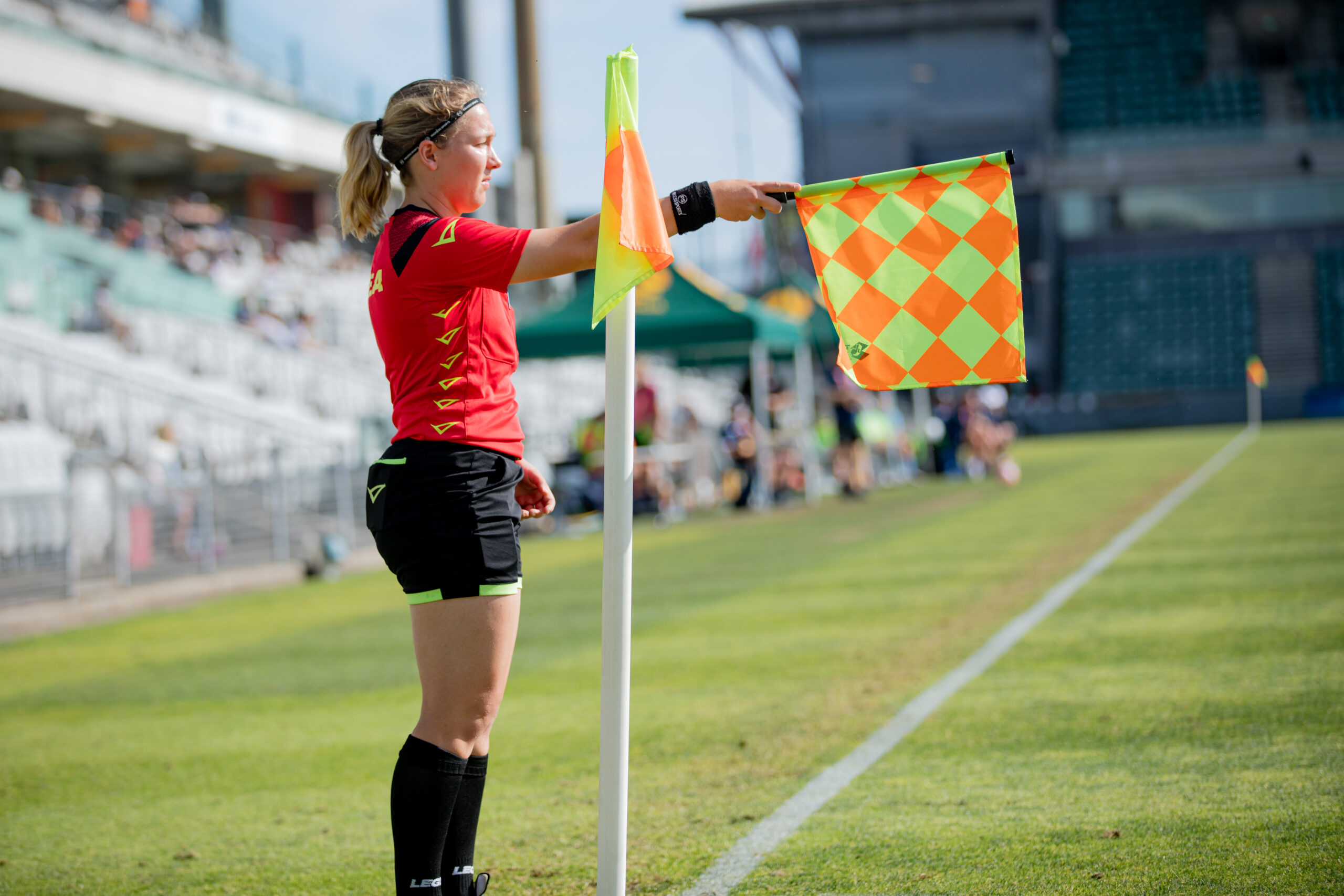
Picture: Australian Sports Commission
What about the mental health side of things for match officials?
We’re seeing an increase in mental health issues across all aspects and being addressed through initiatives from the AIS like Athlete Support lines. We’re seeing this has been an under resourced area over the years and its now coming to the fore.
Everyone has got the right to feel psychologically safe and valued in sport from the person who’s at the barbecue to the officials all the way to the CEOs of the organizations.
This becomes not just a focus on officials but is a much broader piece and we’ve called it out in the ASC Play Well and Win Well strategies – psychological safety is now paramount and a headline act to everything we do.
4. Why don’t umpires come back?
Because retention of umpires is increasingly difficult, some sports are relying on younger umpires who get abused because they don’t have the experience. With major campaigns about bullying all around us, how has this slipped through the cracks?
There is a couple of different things at play here. I feel like we’ve seen this shift in society with regards to online now being a place where people feel comfortable bullying people and that’s become a massive issue within society.
I read an article yesterday that said a substantial amount of young people in this country have been bullied at some stage across different formats. So, this isn’t a problem just for officials, it’s a societal problem.
Maybe I’m a pipe dreamer, but I believe that sport can be a vehicle to showcase to other sectors, industries and even society, of how we can lead and support people.
The key is about authentically wrapping around broad-based systems approaches, and not just focussing on the official there on the weekend.
Support is crucial and making officials more resilient isn’t the answer. It’s about how we put the support mechanisms around them to ensure that we authentically look after them.
We’re currently working through that and we’re not saying we’ve got the answers yet. We’re saying it’s a long-term process. But we’re on it and we’re committed to making sure that we’ve put the systems and the processes around them so that this doesn’t become a problem.
If we’re having this interview in five years’ time, we would like to think that we’ve moved a long way with regards to how we stamp it out in sport.
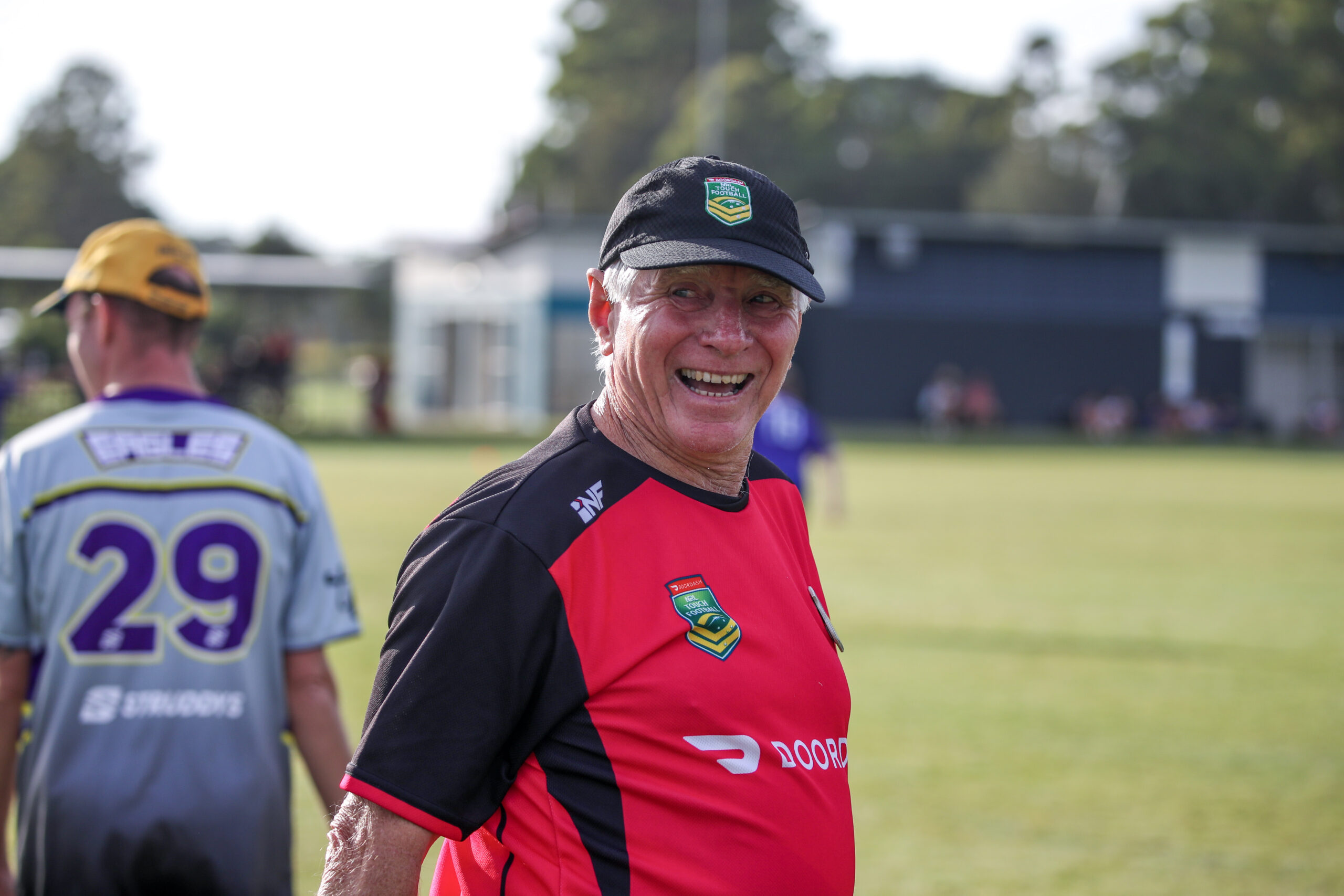
Picture: Australian Sports Commission
We have over a million volunteers officiating in Australia – the backbone of the sport. Churn rates are at staggering levels in some sports – a 30%-35% turnover of match officials every year. Would you call it a crisis or what would constitute calling it a crisis like they are in America?
It’s interesting, that actually marries up with a lot of the research we’ve got with regards to participation churn. I feel like this is a systemic problem with regards to sport and the way we haven’t adapted quickly enough to service modern societal expectations.
We’ve become so focused on recruiting and sometimes we forget about retention so we open up the front door and they all pour in, but we forget to close the back door, so they just pour out.
I would say that as far as how we support, I’m not sure that crisis is the word that I would use, but I would say certainly, it’s a major focus area that needs to be addressed.
And we’re putting things in place now, to ensure as we move forward, we don’t fill over the cracks, but we put some foundations under this to ensure we can set a clear and solid pathway moving forward.
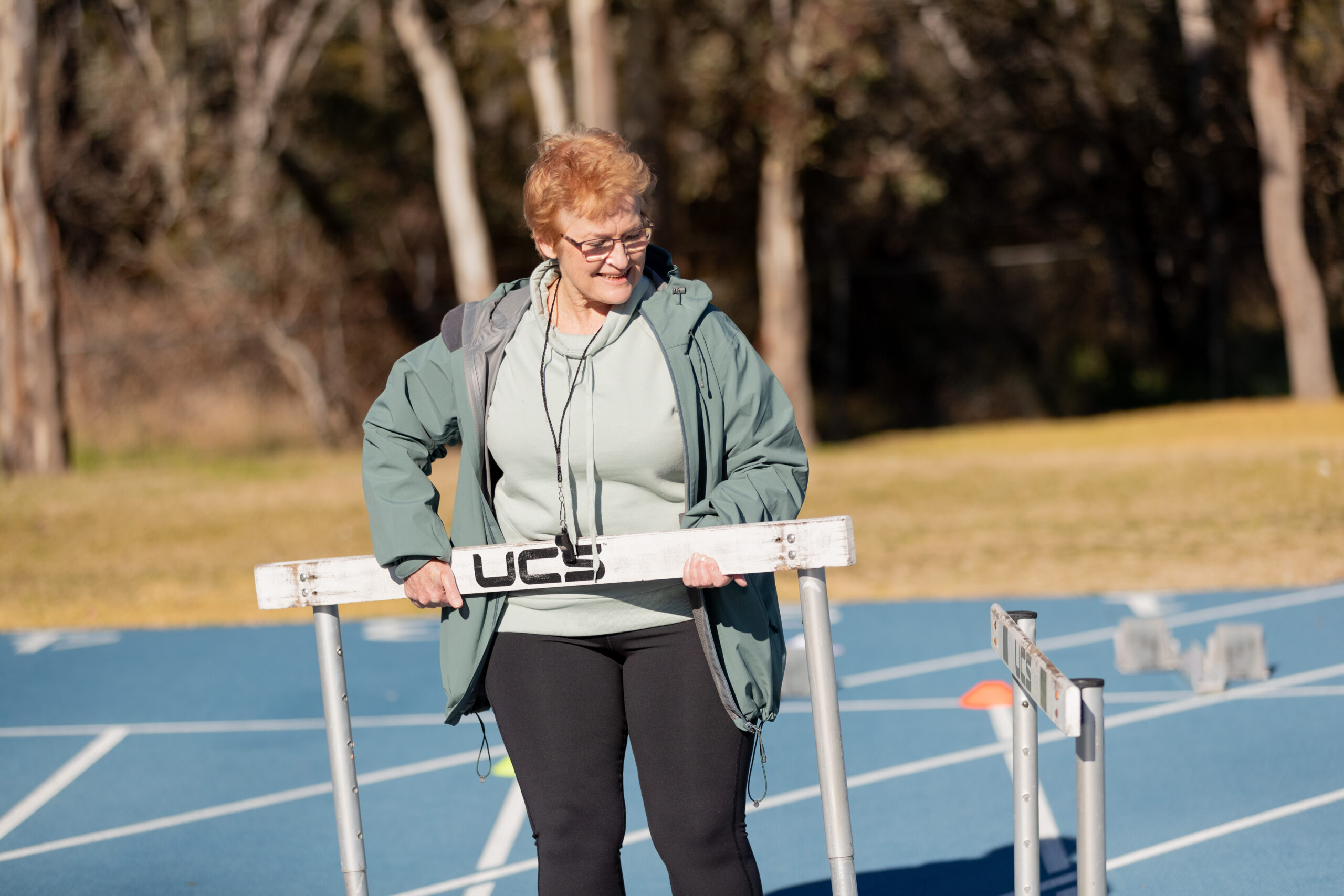
Picture: Australian Sports Commission
5. The untapped power of match officials
I’d like to share a quote from Kieren Perkins, the CEO of the Australian Sports Commission that I’d love your opinion on. “This modern approach supports the development, educating and training of officials empowering them to create safe, inclusive and enjoyable sporting environments where everyone can thrive”
Is the onus on the referee or umpire to create a safe, enjoyable sport environment in addition to the focus on their officiating duties? Shouldn’t that be the onus of be on the others to provide that for the match official?
Yes, and I think it’s about how we collectively all support the environment. But the official has a key role. If you think about the touch point they’ve got on the field that’s away from all the others, away from the other distractions of a crowd or a coach. They’ve got the touch point on the field.
So, to create those environments where they support people, at that moment on the field, they play a critical role. They have got a vital piece of the puzzle but it’s not the only piece.
With such a vital role it makes sense to empower them to understand they can be human when they adjudicate and they can personalise the communications.
I look at someone like Angus Gardner, the rugby official who, when questioned on the field by Hurricanes captain TJ Perenara, the respect shown between those two in a 20 second interaction was a great example.
The right decision ended up being made, the situation didn’t have to go to a to a review panel, it didn’t have to get blown up, it didn’t have to get emotion driven, because they had the mutual respect on the field to have a reasonable conversation to come up with the right solution.
And I think that’s what Kieren’s talking about – having empowerment and we want officials to be human, be themselves and to have personality.
We also want them to understand they’re going to make mistakes, and they can recognise and realise their mistakes.
Keep in mind sport is predicated on mistakes. So, I 100% stand by what Kieren’s saying, but I’m saying that it’s part of it, it’s not all of it.
6. A new revolution of cultural traits?
There’s an Australian cultural trait to rationalise and dismiss negative behaviour. For example, racism it was excused by ‘Larrikinism’. Bad behaviour against match officials was excused as the fruits of ‘passion’. Calling AFL umpires ‘maggots’ was reduced as ‘Aussie humour’.
How can we overcome these cultural traits?
Years ago, we used to smoke in restaurants and planes. They say you can’t take teach an old dog new tricks, but now everyone’s got a mobile phone in their pocket.
It’s simple – if someone is being abusive it’s unacceptable. Society has moved on. That’s no longer accepted, just like smoking in planes and restaurants. We don’t do that anymore.
There are ways we can shift this narrative, but it takes a collaborative effort, and it’s not just a policy that drives that. It’s got to be actions of people who believe and support, and then call out, the fact that this is no longer acceptable.
There’s a course coming out with the Australian Sports Commission next month that is specifically focused on racism and talks about what can you do when you witness something. What can you do as a bystander and what’s my next step?
It’s encouraging we are starting to get more of these really proactive pieces of support for the environment, to help people answer the question, ‘what can I do next?’.
So I’ve heard it, I’m uncomfortable with it. It’s not right. But I don’t say anything because I literally don’t know what to do.
How can we empower not just the officials and the players, but how do we support the people in the stands to do something proactively?
7. Bite-sized learning
12 months ago, you launched the modern coaching course that is used by 50 sports. Has that been a success? Any learnings? What did you learn for the Match Officials course?
The development of the Community Officiating Essential Skills Course benefited from all of the learnings we gained from the Coaching Skills Course.
The Coaching Skills course is one big, long course that sits inside the Learning Centre. We’ve learned if you break them down into individualised modules, it’s more consumable for people and they will be more likely to go in and do them in their own time.
So a 20-minute module is a bus ride, people can get on their phones and do a course.
People are busy and may already have strong skills in some areas like group management of kids, so we have made it convenient for people to take the pieces that are really important or pertinent to them.
These officiating modules are the most up to date that we’ve got and we’ve learned not just from what we know about officiating, but from a lot of common threads from the coaching.
8. Build it, and they will come!
What are your most popular Officiating modules and what story does that tell?
Its early in the program, just the first couple of weeks, but there is a clear story emerging.
Interestingly, the most popular completed module is: ‘Who you Officiate’ – understanding your participant and their needs, is the number one. The number two most popular is ‘How you Improve’, which is self-reflection.
I think that tells a story in itself. Officials are interested in how they can better connect with people. And then they want to know how they can better understand themselves, which is what the two modules focus on, so they are head and shoulders above the others.
The third most clicked module is: ‘What you Officiate’, which is the methods you use specific to the type of match official – from a judge to an on-field official which addresses the customised needs of the diversity of match official roles.
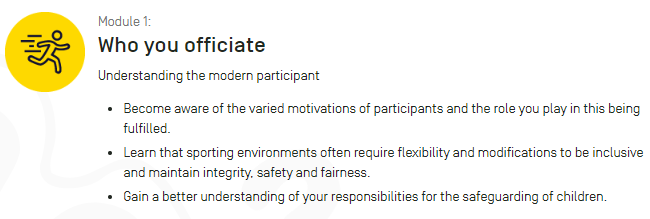
**
In Part 2, Patrick and Cameron dig deeper into the link between coaches and officiating, the unrealistic standard of perfection and how it’s done outside of Australia.
“The fact is sport is predicated on someone making a mistake. It’s interesting in cricket, when an umpire makes a mistake people blow up, yet for a game to finish in cricket there needs 20 wickets or 20 mistakes. (40 in a test match). So, players are making mistakes all the time, but umpires are supposed to be held above that standard.” – Cameron Tradell

Patrick is a founder of Cultural Pulse, a leading multicultural marketing and engagement agency that has worked for the past 15 years on sports participation and fan engagement programs for over 100 communities. He is an author and both of his books ‘The Big O, The Life & Times of Olsen Filipaina‘ and ‘Celestial Footy – The Story of Chinese Aussie Rules‘ have gone into reprint. As a storyteller, his stories on the intersection of sport, history and culture have been published by The Guardian Australia, The Age, the Sydney Morning Herald, The Australian, The Daily Telegraph and The Australian Financial Review. He is passionate about celebrating the role of match officials in sport and is currently the proud coach of the Rockdale Raiders Under 6 Intermediate mixed football team.
